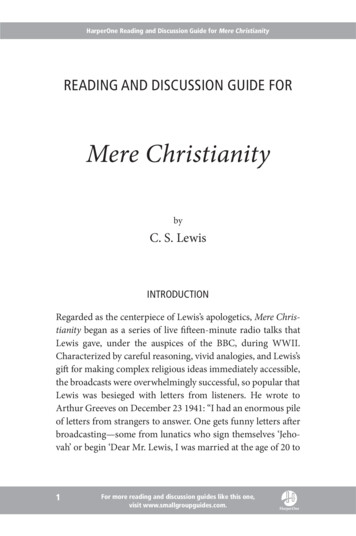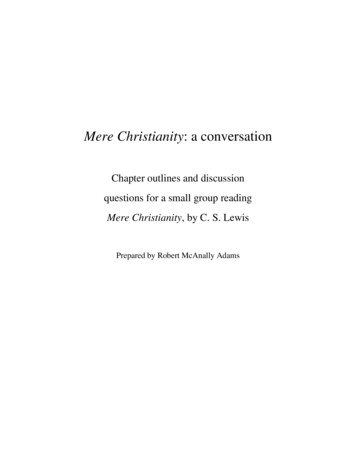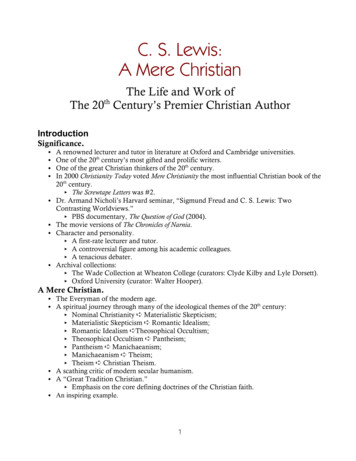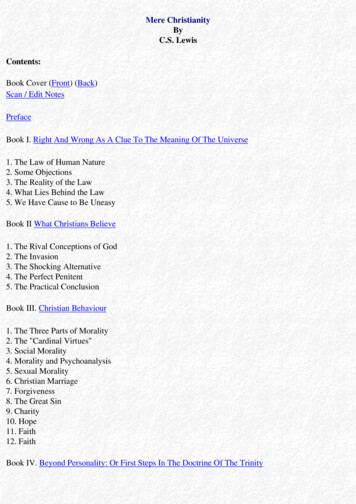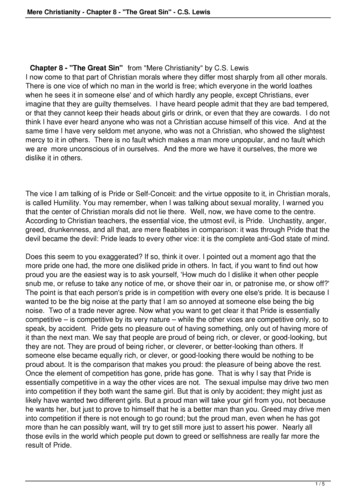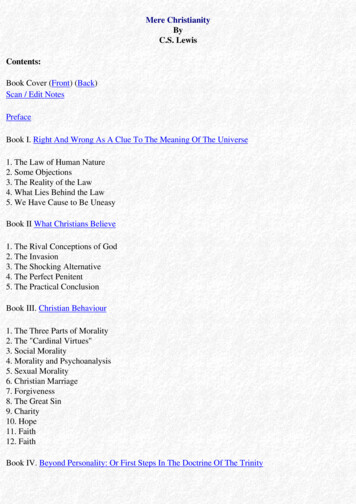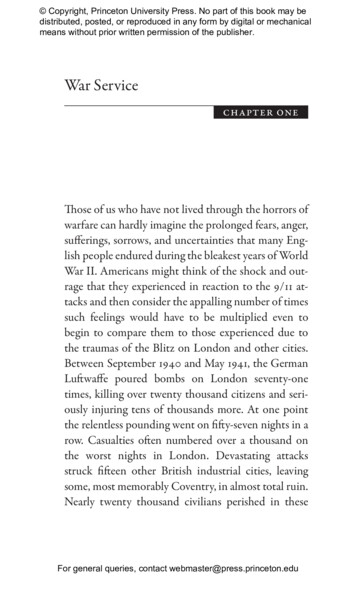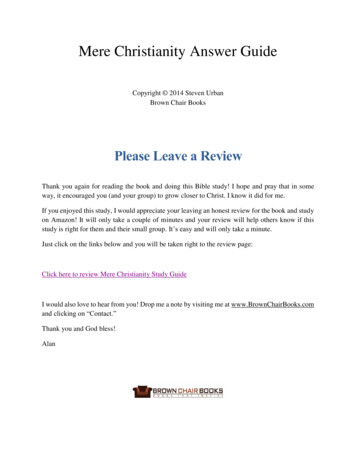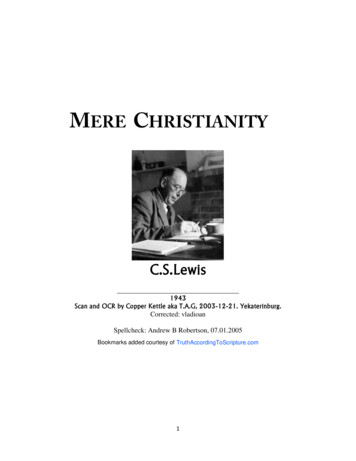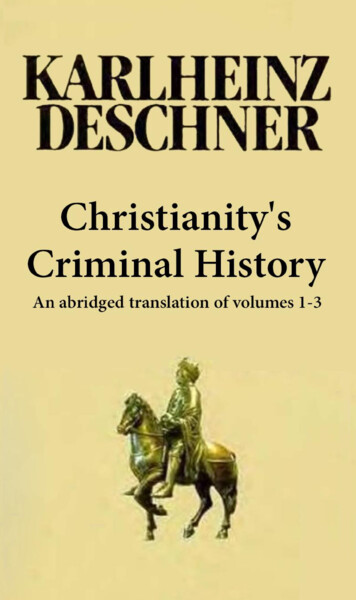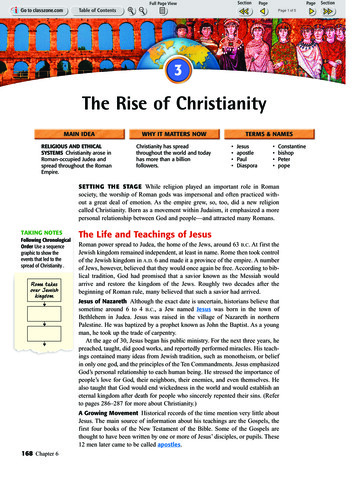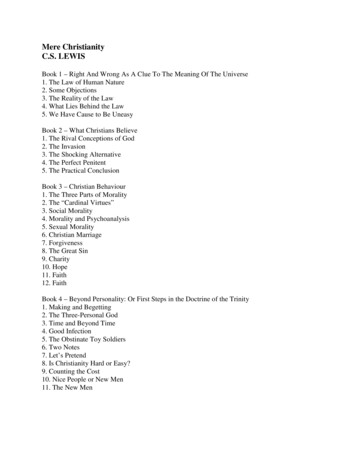
Transcription
Mere ChristianityC.S. LEWISBook 1 – Right And Wrong As A Clue To The Meaning Of The Universe1. The Law of Human Nature2. Some Objections3. The Reality of the Law4. What Lies Behind the Law5. We Have Cause to Be UneasyBook 2 – What Christians Believe1. The Rival Conceptions of God2. The Invasion3. The Shocking Alternative4. The Perfect Penitent5. The Practical ConclusionBook 3 – Christian Behaviour1. The Three Parts of Morality2. The “Cardinal Virtues”3. Social Morality4. Morality and Psychoanalysis5. Sexual Morality6. Christian Marriage7. Forgiveness8. The Great Sin9. Charity10. Hope11. Faith12. FaithBook 4 – Beyond Personality: Or First Steps in the Doctrine of the Trinity1. Making and Begetting2. The Three-Personal God3. Time and Beyond Time4. Good Infection5. The Obstinate Toy Soldiers6. Two Notes7. Let’s Pretend8. Is Christianity Hard or Easy?9. Counting the Cost10. Nice People or New Men11. The New Men
PrefaceThe contents of this book were first given on the air, and then published in threeseparate parts as The Case for Christianity (1943), (*) Christian Behaviour (1943),and Beyond Personality (1945). In the printed versions I made a few additions towhat I had said at the microphone, but otherwise left the text much as it had been.A “talk” on the radio should, I think, be as like real talk as possible, and should notsound like an essay being read aloud. In my talks I had therefore used all thecontractions and colloquialisms I ordinarily use in conversation. In the printedversion I reproduced this, putting don’t and we’ve for do not and we have. Andwherever, in the talks, I had made the importance of a word clear by the emphasisof my voice, I printed it in italics.[*] Published in England under the title Broadcast Talks.I am now inclined to think that this was a mistake—an undesirable hybrid betweenthe art of speaking and the art of writing. A talker ought to use variations of voicefor emphasis because his medium naturally lends itself to that method: but a writerought not to use italics for the same purpose. He has his own, different, means ofbringing out the key words and ought to use them. In this edition I have expandedthe contractions and replaced most of the italics by recasting the sentences inwhich they occurred: but without altering, I hope, the “popular” or “familiar” tonewhich I had all along intended. I have also added and deleted where I thought Iunderstood any part of my subject better now than ten years ago or where I knewthat the original version had been misunderstood by others.The reader should be warned that I offer no help to anyone who is hesitatingbetween two Christian “denominations.” You will not learn from me whether youought to become an Anglican, a Methodist, a Presbyterian, or a Roman Catholic.This omission is intentional (even in the list I have just given the order isalphabetical). There is no mystery about my own position. I am a very ordinarylayman of the Church of England, not especially “high,” nor especially “low,” norespecially anything else. But in this book I am not trying to convert anyone to myown position. Ever since I became a Christian I have thought that the best, perhapsthe only, service I could do for my unbelieving neighbours was to explain anddefend the belief that has been common to nearly all Christians at all times. I hadmore than one reason for thinking this. In the first place, the questions whichdivide Christians from one another often involve points of high Theology or evenof ecclesiastical history which ought never to be treated except by real experts.
I should have been out of my depth in such waters: more in need of help myselfthan able to help others. And secondly, I think we must admit that the discussion ofthese disputed points has no tendency at all to bring an outsider into the Christianfold. So long as we write and talk about them we are much more likely to deterhim from entering any Christian communion than to draw him into our own. Ourdivisions should never be discussed except in the presence of those who havealready come to believe that there is one God and that Jesus Christ is His only Son.Finally, I got the impression that far more, and more talented, authors were alreadyengaged in such controversial matters than in the defence of what Baxter calls“mere” Christianity. That part of the line where I thought I could serve best wasalso the part that seemed to be thinnest. And to it I naturally went.So far as I know, these were my only motives, and I should be very glad if peoplewould not draw fanciful inferences from my silence on certain disputed matters.For example, such silence need not mean that I myself am sitting on the fence.Sometimes I am. There are questions at issue between Christians to which I do notthink I have the answer. There are some to which I may never know the answer: ifI asked them, even in a better world, I might (for all I know) be answered as a fargreater questioner was answered: “What is that to thee? Follow thou Me.” Butthere are other questions as to which I am definitely on one side of the fence, andyet say nothing. For I was not writing to expound something I could call “myreligion,” but to expound “mere” Christianity, which is what it is and was what itwas long before I was born and whether I like it or not.
Some people draw unwarranted conclusions from the fact that I never say moreabout the Blessed Virgin Mary than is involved in asserting the Virgin Birth ofChrist. But surely my reason for not doing so is obvious? To say more would takeme at once into highly controversial regions. And there is no controversy betweenChristians which needs to be so delicately touched as this. The Roman Catholicbeliefs on that subject are held not only with the ordinary fervour that attaches toall sincere religious belief, but (very naturally) with the peculiar and, as it were,chivalrous sensibility that a man feels when the honour of his mother or hisbeloved is at stake.It is very difficult so to dissent from them that you will not appear to them a cad aswell as a heretic. And contrariwise, the opposed Protestant beliefs on this subjectcall forth feelings which go down to the very roots of all Monotheism whatever. Toradical Protestants it seems that the distinction between Creator and creature(however holy) is imperilled: that Polytheism is risen again. Hence it is hard so todissent from them that you will not appear something worse than a heretic—anidolater, a Pagan. If any topic could be relied upon to wreck a book about “mere”Christianity—if any topic makes utterly unprofitable reading for those who do notyet believe that the Virgin’s son is God—surely this is it.Oddly enough, you cannot even conclude, from my silence on disputed points,either that I think them important or that I think them unimportant. For this is itselfone of the disputed points. One of the things Christians are disagreed about is theimportance of their disagreements. When two Christians of differentdenominations start arguing, it is usually not long before one asks whether suchand-such a point “really matters” and the other replies: “Matter? Why, it’sabsolutely essential.”All this is said simply in order to make clear what kind of book I was trying towrite; not in the least to conceal or evade responsibility for my own beliefs. Aboutthose, as I said before, there is no secret. To quote Uncle Toby: “They are writtenin the Common-Prayer Book.”The danger dearly was that I should put forward as common Christianity anythingthat was peculiar to the Church of England or (worse still) to myself. I tried toguard against this by sending the original script of what is now Book II to fourclergymen (Anglican, Methodist, Presbyterian, Roman Catholic) and asking fortheir criticism. The Methodist thought I had not said enough about Faith, and theRoman Catholic thought I had gone rather too far about the comparativeunimportance of theories in explanation of the Atonement. Otherwise all five of us
were agreed. I did not have the remaining books similarly “vetted” because inthem, though differences might arise among Christians, these would be differencesbetween individuals or schools of thought, not between denominations.So far as I can judge from reviews and from the numerous letters written to me, thebook, however faulty in other respects, did at least succeed in presenting an agreed,or common, or central, or “mere” Christianity. In that way it may possibly be ofsome help in silencing the view that, if we omit the disputed points, we shall haveleft only a vague and bloodless H.C.F. The H.C.F. turns out to be something notonly positive but pungent; divided from all non-Christian beliefs by a chasm towhich the worst divisions inside Christendom are not really comparable at all.If I have not directly helped the cause of reunion, I have perhaps made it clear whywe ought to be reunited. Certainly I have met with little of the fabled odiumtheologicum from convinced members of communions different from my own.Hostility has come more from borderline people whether within the Church ofEngland or without it: men not exactly obedient to any communion. This I findcuriously consoling. It is at her centre, where her truest children dwell, that eachcommunion is really closest to every other in spirit, if not in doctrine. And thissuggests that at the centre of each there is something, or a Someone, who againstall divergences of belief, all differences of temperament, all memories of mutualpersecution, speaks with the same voice.So much for my omissions on doctrine. In Book III, which deals with morals, Ihave also passed over some things in silence, but for a different reason. Ever sinceI served as an infantryman in the first world war I have had a great dislike ofpeople who, themselves in ease and safety, issue exhortations to men in the frontline. As a result I have a reluctance to say much about temptations to which Imyself am not exposed. No man, I suppose, is tempted to every sin. It so happensthat the impulse which makes men gamble has been left out of my make-up; and,no doubt, I pay for this by lacking some good impulse of which it is the excess orperversion. I therefore did not feel myself qualified to give advice aboutpermissable and impermissable gambling: if there is any permissable, for I do notclaim to know even that. I have also said nothing about birth-control. I am not awoman nor even a married man, nor am I a priest. I did not think it my place totake a firm line about pains, dangers and expenses from which I am protected;having no pastoral office which obliged me to do so.Far deeper objections may be felt—and have been expressed— against my use ofthe word Christian to mean one who accepts the common doctrines of Christianity.
People ask: “Who are you, to lay down who is, and who is not a Christian?” or“May not many a man who cannot believe these doctrines be far more truly aChristian, far closer to the spirit of Christ, than some who do?” Now this objectionis in one sense very right, very charitable, very spiritual, very sensitive. It hasevery amiable quality except that of being useful. We simply cannot, withoutdisaster, use language as these objectors want us to use it. I will try to make thisclear by the history of another, and very much less important, word.The word gentleman originally meant something recognisable; one who had a coatof arms and some landed property. When you called someone “a gentleman” youwere not paying him a compliment, but merely stating a fact. If you said he wasnot “a gentleman” you were not insulting him, but giving information. There wasno contradiction in saying that John was a liar and a gentleman; any more thanthere now is in saying that James is a fool and an M.A. But then there came peoplewho said—so rightly, charitably, spiritually, sensitively, so anything but usefully—”Ah, but surely the important thing about a gentleman is not the coat of arms andthe land, but the behaviour? Surely he is the true gentleman who behaves as agentleman should? Surely in that sense Edward is far more truly a gentleman thanJohn?”They meant well. To be honourable and courteous and brave is of course a farbetter thing than to have a coat of arms. But it is not the same thing. Worse still, itis not a thing everyone will agree about. To call a man “a gentleman” in this new,refined sense, becomes, in fact, not a way of giving information about him, but away of praising him: to deny that he is “a gentleman” becomes simply a way ofinsulting him. When a word ceases to be a term of description and becomes merelya term of praise, it no longer tells you facts about the object: it only tells you aboutthe speaker’s attitude to that object. (A “nice” meal only means a meal the speakerlikes.)A gentleman, once it has been spiritualised and refined out of its old coarse,objective sense, means hardly more than a man whom the speaker likes. As aresult, gentleman is now a useless word. We had lots of terms of approval already,so it was not needed for that use; on the other hand if anyone (say, in a historicalwork) wants to use it in its old sense, he cannot do so without explanations. It hasbeen spoiled for that purpose.Now if once we allow people to start spiritualising and refining, or as they mightsay “deepening,” the sense of the word Christian, it too will speedily become auseless word. In the first place, Christians themselves will never be able to apply it
to anyone. It is not for us to say who, in the deepest sense, is or is not close to thespirit of Christ. We do not see into men’s hearts. We cannot judge, and are indeedforbidden to judge.It would be wicked arrogance for us to say that any man is, or is not, a Christian inthis refined sense. And obviously a word which we can never apply is not going tobe a very useful word. As for the unbelievers, they will no doubt cheerfully use theword in the refined sense. It will become in their mouths simply a term of praise.In calling anyone a Christian they will mean that they think him a good man. Butthat way of using the word will be no enrichment of the language, for we alreadyhave the word good. Meanwhile, the word Christian will have been spoiled for anyreally useful purpose it might have served.We must therefore stick to the original, obvious meaning. The name Christians wasfirst given at Antioch (Acts xi. 26) to “the disciples,” to those who accepted theteaching of the apostles. There is no question of its being restricted to those whoprofited by that teaching as much as they should have. There is no question of itsbeing extended to those who in some refined, spiritual, inward fashion were “farcloser to the spirit of Christ” than the less satisfactory of the disciples. The point isnot a theological, or moral one. It is only a question of using words so that we canall understand what is being said. When a man who accepts the Christian doctrinelives unworthily of it, it is much clearer to say he is a bad Christian than to say heis not a Christian.I hope no reader will suppose that “mere” Christianity is here put forward as analternative to the creeds of the existing communions—as if a man could adopt it inpreference to Congregationalism or Greek Orthodoxy or anything else. It is morelike a hall out of which doors open into several rooms. If I can bring anyone intothat hall I shall have done what I attempted. But it is in the rooms, not in the hall,that there are fires and chairs and meals. The hall is a place to wait in, a place fromwhich to try the various doors, not a place to live in. For that purpose the worst ofthe rooms (whichever that may be) is, I think, preferable.It is true that some people may find they have to wait in the hall for a considerabletime, while others feel certain almost at once which door they must knock at. I donot know why there is this difference, but I am sure God keeps no one waitingunless He sees that it is good for him to wait. When you do get into your room youwill find that the long wait has done you some kind of good which you would nothave had otherwise. But you must regard it as waiting, not as camping. You mustkeep on praying for light: and, of course, even in the hall, you must begin trying to
obey the rules which are common to the whole house. And above all you must beasking which door is the true one; not which pleases you best by its paint andpaneling.In plain language, the question should never be: “Do I like that kind of service?”but “Are these doctrines true: Is holiness here? Does my conscience move metowards this? Is my reluctance to knock at this door due to my pride, or my meretaste, or my personal dislike of this particular door-keeper?”When you have reached your own room, be kind to those Who have chosendifferent doors and to those who are still in the hall. If they are wrong they needyour prayers all the more; and if they are your enemies, then you are under ordersto pray for them. That is one of the rules common to the whole house.
Book I – Right And Wrong As A Clue To The Meaning Of The Universe1. The Law Of Human NatureEvery one has heard people quarrelling. Sometimes it sounds funny and sometimesit sounds merely unpleasant; but however it sounds, I believe we can learnsomething very important from listening to the kind of things they say. They saythings like this: “How’d you like it if anyone did the same to you?”—”That’s myseat, I was there first”—”Leave him alone, he isn’t doing you any harm”— “Whyshould you shove in first?”—”Give me a bit of your orange, I gave you a bit ofmine”—”Come on, you promised.” People say things like that every day, educatedpeople as well as uneducated, and children as well as grown-ups.Now what interests me about all these remarks is that the man who makes diem isnot merely saying that the other man’s behaviour does not happen to please him.He is appealing to some kind of standard of behaviour which he expects the otherman to know about. And the other man very seldom replies: “To hell with yourstandard.” Nearly always he tries to make out that what he has been doing does notreally go against the standard, or that if it does there is some special excuse. Hepretends there is some special reason in this particular case why the person whotook the seat first should not keep it, or that things were quite different when hewas given the bit of orange, or that something has turned up which lets him offkeeping his promise.It looks, in fact, very much as if both parties had in mind some kind of Law orRule of fair play or decent behaviour or morality or whatever you like to call it,about which they really agreed. And they have. If they had not, they might, ofcourse, fight like animals, but they could not quarrel in the human sense of theword. Quarrelling means trying to show that the other man is in the wrong. Andthere would be no sense in trying to do that unless you and he had some sort ofagreement as to what Right and Wrong are; just as there would be no sense insaying that a footballer had committed a foul unless there was some agreementabout the rules of football.Now this Law or Rule about Right and Wrong used to be called the Law of Nature.Nowadays, when we talk of the “laws of nature” we usually mean things likegravitation, or heredity, or the laws of chemistry. But when the older thinkerscalled the Law of Right and Wrong “the Law of Nature,” they really meant theLaw of Human Nature. The idea was that, just as all bodies are governed by thelaw of gravitation and organisms by biological laws, so the creature called man
also had his law—with this great difference, that a body could not choose whetherit obeyed the law of gravitation or not, but a man could choose either to obey theLaw of Human Nature or to disobey it.We may put this in another way. Each man is at every moment subjected to severaldifferent sets of law but there is only one of these which he is free to disobey. As abody, he is subjected to gravitation and cannot disobey it; if you leave himunsupported in mid-air, he has no more choice about falling than a stone has. As anorganism, he is subjected to various biological laws which he cannot disobey anymore than an animal can. That is, he cannot disobey those laws which he shareswith other things; but the law which is peculiar to his human nature, the law hedoes not share with animals or vegetables or inorganic things, is the one he candisobey if he chooses.This law was called the Law of Nature because people thought that every oneknew it by nature and did not need to be taught it. They did not mean, of course,that you might not find an odd individual here and there who did not know it, justas you find a few people who are colour-blind or have no ear for a tune. But takingthe race as a whole, they thought that the human idea of decent behaviour wasobvious to every one. And I believe they were right. If they were not, then all thethings we said about the war were nonsense. What was the sense in saying theenemy were in the wrong unless Right is a real thing which the Nazis at bottomknew as well as we did and ought to have practised? If they had had no notion ofwhat we mean by right, then, though we might still have had to fight them, wecould no more have blamed them for that than for the colour of their hair.I know that some people say the idea of a Law of Nature or decent behaviourknown to all men is unsound, because different civilisations and different ageshave had quite different moralities.
But this is not true. There have been differences between their moralities, but thesehave never amounted to anything like a total difference. If anyone will take thetrouble to compare the moral teaching of, say, the ancient Egyptians, Babylonians,Hindus, Chinese, Greeks and Romans, what will really strike him will be how verylike they are to each other and to our own. Some of the evidence for this I have puttogether in the appendix of another book called The Abolition of Man; but for ourpresent purpose I need only ask the reader to think what a totally different moralitywould mean. Think of a country where people were admired for running away inbattle, or where a man felt proud of double-crossing all the people who had beenkindest to him.You might just as well try to imagine a country where two and two made five. Menhave differed as regards what people you ought to be unselfish to—whether it wasonly your own family, or your fellow countrymen, or everyone. But they havealways agreed that you ought not to put yourself first. Selfishness has never beenadmired. Men have differed as to whether you should have one wife or four. Butthey have always agreed that you must not simply have any woman you liked.But the most remarkable thing is this. Whenever you find a man who says he doesnot believe in a real Right and Wrong, you will find the same man going back onthis a moment later. He may break his promise to you, but if you try breaking oneto him he will be complaining “It’s not fair” before you can say Jack Robinson. Anation may say treaties do not matter, but then, next minute, they spoil their caseby saying that the particular treaty they want to break was an unfair one. But iftreaties do not matter, and if there is no such thing as Right and Wrong— in otherwords, if there is no Law of Nature—what is the difference between a fair treatyand an unfair one? Have they not let the cat out of the bag and shown that,whatever they say, they really know the Law of Nature just like anyone else?It seems, then, we are forced to believe in a real Right and Wrong. People may besometimes mistaken about them, just as people sometimes get their sums wrong;but they are not a matter of mere taste and opinion any more than themultiplication table. Now if we are agreed about that, I go on to my next point,which is this. None of us are really keeping the Law of Nature. If there are anyexceptions among you, I apologise to them. They had much better read some otherwork, for nothing I am going to say concerns them. And now, turning to theordinary human beings who are left:I hope you will not misunderstand what I am going to say. I am not preaching, andHeaven knows I do not pretend to be better than anyone else. I am only trying to
call attention to a fact; the fact that this year, or this month, or, more likely, thisvery day, we have failed to practise ourselves the kind of behaviour we expectfrom other people. There may be all sorts of excuses for us. That time you were sounfair to the children was when you were very tired. That slightly shady businessabout the money— the one you have almost forgotten—came when you were veryhard up. And what you promised to do for old So-and-so and have never done—well, you never would have promised if you had known how frightfully busy youwere going to be. And as for your behaviour to your wife (or husband) or sister (orbrother) if I knew how irritating they could be, I would not wonder at it—and whothe dickens am I, anyway? I am just the same.That is to say, I do not succeed in keeping the Law of Nature very well, and themoment anyone tells me I am not keeping it, there starts up in my mind a string ofexcuses as long as your arm. The question at the moment is not whether they aregood excuses. The point is that they are one more proof of how deeply, whether welike it or not, we believe in the Law of Nature. If we do not believe in decentbehaviour, why should we be so anxious to make excuses for not having behaveddecently? The truth is, we believe in decency so much—we feel the Rule or Lawpressing on us so— that we cannot bear to face the fact that we are breaking it, andconsequently we try to shift the responsibility. For you notice that it is only for ourbad behaviour that we find all these explanations.It is only our bad temper that we put down to being tired or worried or hungry; weput our good temper down to ourselves. These, then, are the two points I wanted tomake. First, that human beings, all over the earth, have this curious idea that theyought to behave in a certain way, and cannot really get rid of it. Secondly, that theydo not in fact behave in that way. They know the Law of Nature; they break it.These two facts are the foundation of all clear thinking about ourselves and theuniverse we live in.2 – Some ObjectionsIf they are the foundation, I had better stop to make that foundation firm before Igo on. Some of the letters I have had show-that a good many people find it difficultto understand just what this Law of Human Nature, or Moral Law, or Rule ofDecent Behaviour is.For example, some people wrote to me saying, “Isn’t what you call the Moral Lawsimply our herd instinct and hasn’t it been developed just like all our otherinstincts?” Now I do not deny that we may have a herd instinct: but that is not what
I mean by the Moral Law. We all know what it feels like to be prompted byinstinct—by mother love, or sexual instinct, or the instinct for food. It means thatyou feel a strong want or desire to act in a certain way. And, of course, wesometimes do feel just that sort of desire to help another person: and no doubt thatdesire is due to the herd instinct. But feeling a desire to help is quite different fromfeeling that you ought to help whether you want to or not. Supposing you hear acry for help from a man in danger.You will probably feel two desires—one a desire to give help (due to your herdinstinct), the other a desire to keep out of danger (due to the instinct for selfpreservation). But you will find inside you, in addition to these two impulses, athird thing which tells you that you ought to follow the impulse to help, andsuppress the impulse to run away. Now this thing that judges between twoinstincts, that decides which should be encouraged, cannot itself be either of them.You might as well say that the sheet of music which tells you, at a given moment,to play one note on the piano and not another, is itself one of the notes on thekeyboard. The Moral Law tells us the tune we have to play: our instincts aremerely the keys.Another way of seeing that the Moral Law is not simply one of our instincts is this.If two instincts are in conflict, and there is nothing in a creature’s mind exceptthose two instincts, obviously the stronger of the two must win. But at thosemoments when we are most conscious of the Moral Law, it usually seems to betelling us to side with the weaker of the two impulses. You probably want to besafe much more than you want to help the man who is drowning: but the MoralLaw tells you to help him all the same. And surely it often tells us to try to makethe right impulse stronger than it naturally is? I mean, we often feel it our duty tostimulate the herd instinct, by waking up our imaginations and arousing our pityand so on, so as to get up enough steam for doing the right thing. But clearly weare not acting from instinct when we set about making an instinct stronger than itis. The thing that says to you, “Your herd instinct is asleep. Wake it up,” cannotitself be the herd instinct. The thing that tells you which note on the piano needs tobe played louder cannot itself be that note.Here is a third way of seeing it If the Moral Law was one of our instincts, we oughtto be able to point to some one impulse inside us which was always what we call“good,” always in agreement with the rule of right behaviour. But you cannot.There is none of our impulses which the Moral Law may not sometimes tell us tosuppress, and none which it may not sometimes tell us to encourage. It is a mistaketo think that some of our impulses— say mother love or patriotism—are good, and
others, like sex or the fighting instinct, are bad. All we mean is that the occasionson which the fighting instinct or the sexual desire need to be restrained are rathermore frequent than those for restraining mother love or patriotism. But there aresituations in which it is the duty of a married man t
Mere Christianity C.S. LEWIS Book 1 - Right And Wrong As A Clue To The Meaning Of The Universe 1. The Law of Human Nature 2. Some Objections 3. The Reality of the Law 4. What Lies Behind the Law 5. We Have Cause to Be Uneasy Book 2 - What Christians Believe 1. The Rival Conceptions of God 2. The Invasion 3. The Shocking Alternative 4.
